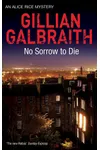Picture a Scottish storyteller who swapped courtrooms for crime scenes, crafting gripping mysteries that pulse with Edinburgh’s heartbeat—meet Gillian Galbraith! A former advocate turned crime fiction author, Galbraith brings a lawyer’s precision and a novelist’s flair to her beloved Alice Rice series, starting with Blood in the Water in 2009. Her journey from legal battles to literary triumphs proves it’s never too late to chase a dream.
With a knack for weaving authentic police procedurals and a deep love for Scotland’s capital, Galbraith has carved a niche in Scottish crime fiction. Her stories aren’t just whodunits—they’re vivid portraits of Edinburgh’s gritty underbelly and professional elite, served with a side of heart. Ready to dive into her world?
The Making of Gillian Galbraith
Born in Coupar Angus, Perthshire, in January 1957, Gillian Galbraith grew up near Haddington, East Lothian, where her early years were shaped by a convent education and studies at the Universities of Edinburgh and Dundee. Before her literary career, she wore many hats: journalist, horoscope writer for the Dundee Courier, agony aunt for a teen magazine, and legal correspondent for The Scottish Farmer and The Times. In 1987, she became an advocate, specializing in medical negligence and agricultural law for 17 years. It wasn’t until her daughter Daisy’s birth in 1999 and a thyroid-related health scare that Galbraith, at 42, pivoted to fiction, channeling her legal expertise into crime writing.
Gillian Galbraith’s Unforgettable Stories
Galbraith’s debut, Blood in the Water (2007), introduced Detective Sergeant Alice Rice, a sharp, relatable Edinburgh cop navigating grisly murders in the city’s affluent New Town. Praised by Alexander McCall Smith for its page-turning energy, the novel set the tone for the six-book Alice Rice series, including Where the Shadow Falls (2007), which tackles wind-farm controversies, and Dying of the Light (2009), inspired by real-life prostitute killings. Her 2014 novel The Good Priest launched a new series featuring Father Vincent Ross, a sleuthing priest who solves crimes through gossip and guile.
Galbraith’s style is grounded in authenticity, drawing on her legal background and Edinburgh’s rich tapestry. Her plots blend meticulous police work with human struggles—think disillusioned detectives and morally complex killers. The End of the Line (2019), a standalone inspired by the 1970s blood contamination scandal, showcases her ability to tackle real-world tragedies with sensitivity, earning acclaim from The Times as a top holiday read. Whether exploring Edinburgh’s docks or its legal circles, Galbraith’s stories are as atmospheric as they are thrilling.
Her novels resonate because they’re rooted in reality. Galbraith’s time in the High Court of Justiciary and her involvement in Scotland’s Penrose Inquiry into the blood scandal infuse her work with procedural accuracy and emotional depth. Fans of Ian Rankin will appreciate her Edinburgh-centric mysteries, though Galbraith’s focus on female detectives like Alice Rice adds a fresh perspective to the genre.
Why Gillian Galbraith Matters
Gillian Galbraith’s impact lies in her ability to humanize crime fiction. Her authentic portrayal of Edinburgh’s legal and medical worlds, combined with strong female leads, has earned her a loyal following and appearances at festivals like Bloody Scotland and the Edinburgh Book Festival. By addressing real issues—like the NHS blood scandal—she bridges fiction and reality, sparking conversations about justice and morality. Her late start as a writer inspires aspiring authors, showing that passion and persistence can redefine a career.
In a genre dominated by gritty male detectives, Galbraith’s Alice Rice stands out as a beacon of resilience and relatability, cementing her place in Scottish crime fiction. Her work continues to captivate readers who crave mysteries with heart and soul.
- Born: January 1957, Coupar Angus, Perthshire
- Key Works: Blood in the Water, The End of the Line, The Good Priest
- Notable Appearances: Edinburgh Book Festival, Bloody Scotland
Snag Blood in the Water and dive into Gillian Galbraith’s thrilling world of Edinburgh crime!







